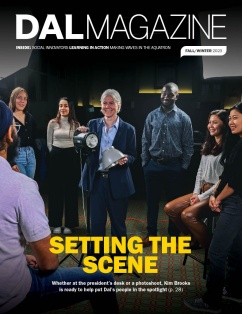Once a day, Sean Foreman (LLB’98), KC, takes a moment to reflect on the judicial order that overturned the ban on same-sex marriage in Nova Scotia. Not just because he gained the right to marry his husband, Andre [Bernard (MD’06, PGM’12)], but also because he has it framed and hanging in his home office. Foreman was in court the day the order was issued, September 24, 2004. A junior lawyer at the time, he was representing three couples and the in challenging the ban. “When I am having one of those days when I feel like I am spinning my wheels and I’m not making a difference, I can look at that and it’s very grounding,” he says. “But it’s also a reminder that we must always be vigilant and can’t sit on our laurels, given what is happening south of the border, around the world, and even with recent protests against inclusive educational policies here in NS and across Canada.”
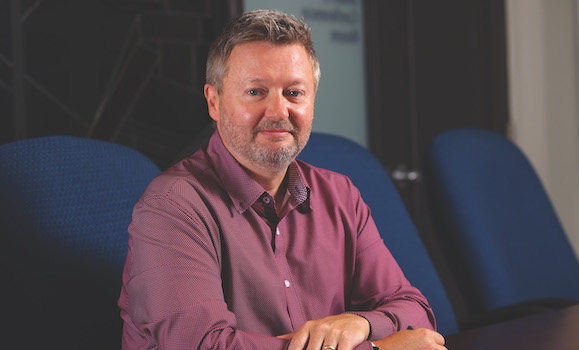
Sean Foreman (Nick Pearce photo).
Foreman’s determination to achieve societal change, and his vigilance in the face of threats to a more inclusive and equitable society, is admirable. It has also been a distinguishing characteristic among generations of Dalhousie Schulich School of Law graduates. Some alumni, like Foreman, have taken on outdated or oppressive policies and laws. Some have taken a principled stand against human rights violations, despite drawing considerable initial public and political backlash. And some have been trailblazers who not only became the first in their community to achieve a particular professional or societal milestone, but also used that opportunity to encourage others to follow in their footsteps.
Taken individually, the achievements of these alumni are impressive examples of what one person can do with a Dalhousie law degree. Collectively, they form a rich tapestry of positive, lasting societal change, one that began to take shape with the law school’s formation in 1883 and continues to grow with each new generation of students. One of the most notable contributors to that tapestry is Justice Anne Derrick (LLB’80), KC. During her 24 years as a practicing lawyer, she took on social justice, public interest, and equality cases whose outcomes had major societal reverberations. It was Derrick who won a decisive victory in the fight for reproductive rights through her representation of Dr. Henry Morgentaler. She also helped expose the systemic racism that led to the wrongful conviction of Donald Marshall Jr. as one of the lawyers who represented him during the Royal Commission inquiry into his case. And in 1984, Justice Derrick helped overturn a provincial government injunction aimed at preventing women in the sex trade from working in certain parts of downtown Halifax. It was that effort that led Derrick to become a founding member of Stepping Stone in 1987. It is the only nonprofit in Atlantic Canada that offers support and services to ensure the health, safety, and well-being of people who are, or were, involved in the sex trade.
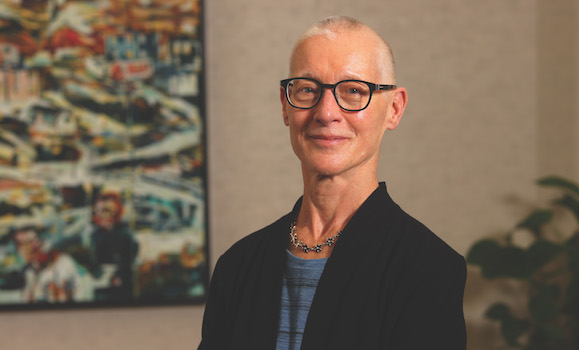
Justice Anne Derrick (Nick Pearce photo).
“It was very important for those of us that were involved in Stepping Stone’s development that it be non-judgmental and inclusive,” she says. “It feels good to be a contributor to that and I feel the same way about my involvement in the Morgentaler case. That sense that is it possible to achieve social progress against injustice, or contribute to systemic change, does give one hope that the world can be made a better place for people who are outside the circle of privilege that I enjoy.”
That desire to make the world better for others was instilled by Justice Derrick’s father, who often questioned injustices he saw. Dalhousie Legal Aid Service offered her an opportunity to explore that passion. “The people I was representing were the people I wanted to be serving,” she says. “They were the reason why I was getting a law degree. They were not privileged, so it was a tremendously important experience for me.”
In some ways, Justice Derrick’s path to being a social innovator parallels that of Douglas Ruck (LLB’77), KC. He, too, drew inspiration from his father, Calvin (DSW’79, LLD’94), a senator and activist renowned for breaking down barriers facing African Nova Scotians. And he saw the law as a tool he could use to take on privilege and inequity. But over the course of his studies, Ruck realized how this tool could be used against him and others. “I saw that it could prevent change or make it much more difficult for certain members of the community to acquire the rights, privileges, and type of treatment they deserved,” he says. “That was another motivation for me.”
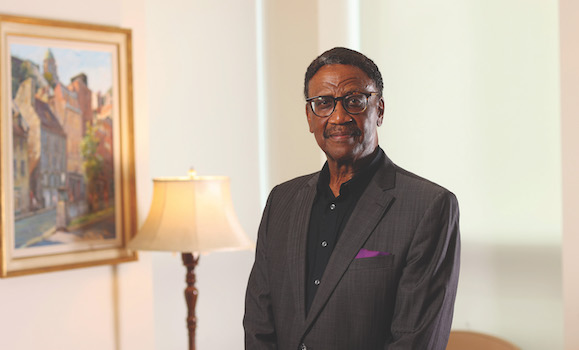
Douglas Ruck (Nick Peace photo).
Ruck subsequently devoted his energy and expertise to making both the law and society more equitable, tackling issues such as labour relations, human rights, and occupational health and safety. Based on that experience, the College of Physicians and Surgeons of Nova Scotia asked Ruck to chair a task force into systemic anti-Black racism within the College in 2021. Motivated in part by the death of George Floyd, he agreed. The result was a May 2022 report which not only found that there was anti-Black racism within the College, but also that the College had failed to understand or act against it. The report made several recommendations for improvement, including the establishment of an equity, diversity, and inclusion committee and the development of an action plan to address anti-Black racism and implement changes identified in the report.
“I’m proud of the work of the task force and am glad to see that the College has followed our recommendation to create a committee to monitor and direct change,” Ruck says. “But we still live in a society that has so much in the way of disparities and anti-Black racism. And the so-called end of COVID took away the urgency to correct those societal issues. So, I don’t see the task force’s work as a culmination; it’s the beginning. It’s something to grow and expand on. And I hope it motivates and gives others the encouragement to add their voices to making a difference.”
Related reading:ĚýDal alum leads review of systemic discrimination at barristers’ and physicians’ societies (Dal News, 2021)
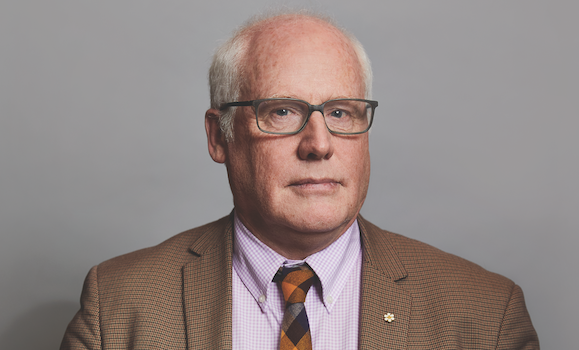
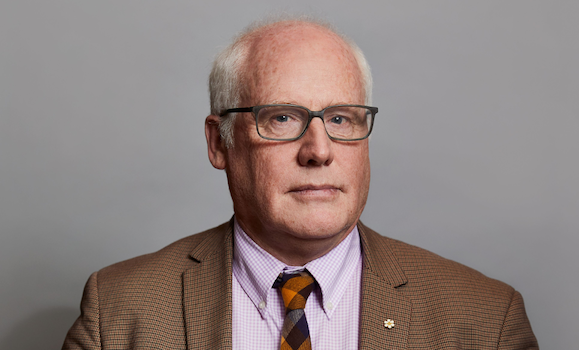
Alex Neve (Supplied).
“I’d been actively engaged in campaigning to strengthen global standards to protect child soldiers,” he says. “If this was the case here, which it seemed to be, then the human rights approach kicks in and you realize this is someone who needs to be seen as a victim, not as a perpetrator. Based on that, we were off and running.”
Neve’s advocacy began with letter-writing campaigns and media interviews and progressed to submissions to United Nations human rights bodies. In 2010, he travelled to Guantanamo Bay to observe the U.S. military commission trial involving Khadr. These efforts helped shift public and political opinion on repatriation, enabling Khadr to return to Canada in 2012. But Neve’s work was not done. His continued advocacy on Khadr’s behalf helped secure an apology and compensation from the government of Canada in 2017.
“It’s cases like this that remind me why I became a human rights advocate,” Neve says. “It’s about more than the legal concepts we debate in law school or arcane arguments we have in front of the Supreme Court of Canada. It’s real people’s lives, often those who have been vilified and abandoned by society. That’s when showing up as a human rights advocate matters most. And it’s so reinforcing and bolstering when you get to be part of that win.”
Related reading:Ěý'People will prevail': International human rights lawyer receives 2022 Weldon Award for Unselfish Public Service (Dal News, 2022)
Sometimes, the win is a personal one that becomes a springboard for societal change. That’s what happened in 1987 when Corrine Sparks (LLB’79, LLM’01) became the province’s first African Nova Scotian judge and the first Black female judge in Canada. It was a significant achievement, and not one Sparks had dreamed was possible. Growing up in a historically Black Nova Scotian community, she had not encountered any African Nova Scotians who had entered the legal profession who could provide professional mentorship. But her mother, community elders, and teachers inspired her. These informal mentors, coupled with her employment at the province’s Human Rights Commission, created an awareness of the value of a law degree to promote and achieve social and racial justice.
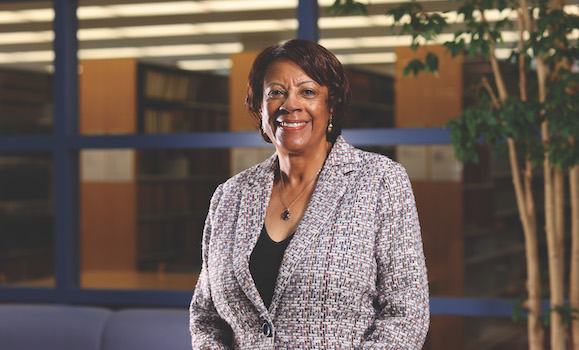
Corinne Sparks (Nick Pearce photo).
Realizing she now had an opportunity to open doors for a new generation, Sparks helped launch and worked with the which is dedicated to diversifying the profession. She provided mentorship and encouragement to Black members of the bar in Nova Scotia and Ontario who were interested in applying for judgeships. And she pursued increased diversity in the legal profession as a member of the Canadian Bar Association’s Gender Equality Task Force.
“It is very inspiring to witness the success of several Black lawyers and judges and the general advancement of Indigenous peoples and people of colour in the profession,” Sparks says. “The profession is becoming more inclusive. This change has been slow, but with ardent efforts to incorporate equity, diversity, and inclusion to overcome historical and systemic racial barriers, we can finally see it happening. This provides me with a comforting belief that there will be improvements for the generations to come.”
Although Sparks retired from the bench in 2021, she continues to apply her Dal law knowledge in ways that are impactful. She is one of three commissioners with the provincial government’s Land Title Initiative (LTI), which is helping residents in the communities of North Preston, East Preston, Cherry Brook/Lake Loon, Lincolnville, and Sunnyville gain clear title to their properties with the aid of significant government resources.
“I’m grateful to be part of this initiative as it is aligned with my post-retirement plans to serve,” Sparks says. “This program is meant to address historical wrongs and systemic discrimination, which have prevented community members from obtaining conveyances to their property. This has long been a blemish on the history of Nova Scotia as identified by a UN working group in 2017. To me, LTI is an important step as we march forward in the right direction.”
Related reading:ĚýJudge Corrine Sparks named 2020 Recipient of the Weldon Award for Unselfish Public Service (Dal News, 2020)
For Sparks, Dal Law was a means for transforming her interest in human rights into action. Heather Mcneill (LLB’94), KC shares that sentiment. She enrolled at the school after working as a nurse for several years, believing that a law degree would enable her to make a difference in a more profound way. “By practising law,” she says, “I could influence decision-makers to look at an issue from a different perspective and that could lead to real change for the people I serve. That was a goal of mine.”
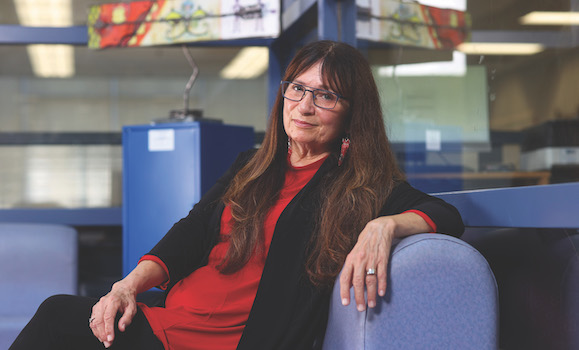
Heather Mcneill (Nick Pearce photo).
As McNeill gained legal tools and skills, she also gained clarity on how she wanted to use them as a Mi'kmaw woman. For 21 years, she worked at Dalhousie Legal Aid Service, providing representation to individuals who otherwise would not have been able to afford legal advice and pushing for change to make the justice system more equitable. By any measure, it was an impressive career, but McNeill was only getting started. After retiring in 2019, she became a legal advisor with the Maw- Kleyu’kik Knijannaq (keeping our children together). This initiative, overseen by Kwilmu’kw Maw-Klusuaqn (we are seeking consensus)—the Mi’kmaw treaty rights secretariat — is developing a governance model for a Mi’kmaw child and family well- being services system. This groundbreaking undertaking, led by McNeill and the team she works with, will not only be guided by Mi’kmaq law and policy, but also offer culturally appropriate family support services that promote keeping children with their families in their communities.
“In my entire legal career, I never thought I would see the day when we would have our own Mi'kmaw governing authority overseeing our own system of child and family well- being,” McNeill says. “That’s why I am doing it. Mi'kmaq reclaiming jurisdiction over child welfare is what drives me and it’s an amazing legacy for me to be part of.”
Related reading:ĚýThe gold standard: Meet the alumni receiving this year's inaugural Dalhousie Aurum Awards (Dal News, 2019)
Legacies are powerful. Not just the ones we contribute to, but also the ones we aspire to create. In legacies, we find the inspiration to dream of a better life, work toward it, and protect it. Dalhousie law alumni have forged one their own — one of positive societal impacts. In doing so, they have cemented the Schulich School of Law’s legacy as a place that imparts the necessary tools and motivation for making a difference.
“This school gave me the confidence and the ability to lean into what I wanted to achieve in the world,” Foreman says. “I really valued that experience, and the mentorships and friendships I found at Schulich, and still do to this day. They helped make me who I am.”
This story appeared in the DAL Magazine Fall/Winter 2023 issue. Flip through the rest of the issue using the links below.

